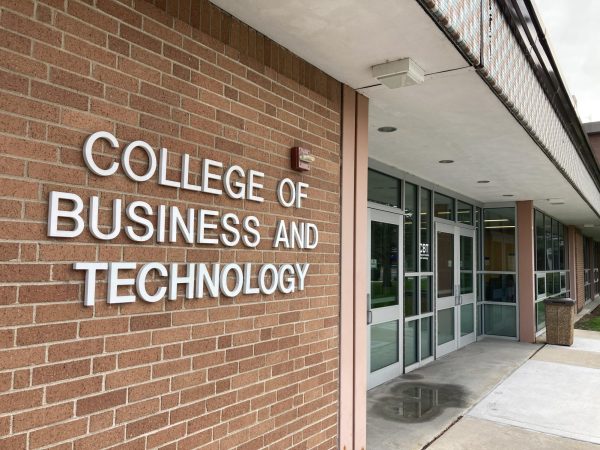Furloughs to begin Spring Break
State budget impasse forces termination of about 300 student aides
Northeastern Illinois University Professor Cyndi Moran protests the budget impasse in Feb. 2016, just prior to NEIU’s first furlough.
NEIU will shut down its operations during Spring Break as it begins a furlough program for employees beginning March 20, Interim President Richard J. Helldobler announced.
A university-wide shutdown means that all university services, including instructional services such as computer labs, the writing center and the library, will come to a halt except for minimal staffing by university police and engineers. Classes and operations, however, will resume March 27.
Approximately 300 student aides will be terminated prior to the implementation of this furlough. Exceptions will be made for students who are in positions related to health and welfare or public safety, or that are part of a student’s financial aid or for academic credit. The exceptions are made in accordance to a new Civil Service Furlough rule. There is no date set as of March 3 when the terminations will take effect.
Additionally, extra-help workers’ employment will also be terminated at the start of Spring Break.
“No matter how you look at it, any furlough program would result in a harmful interruption in the academic lives of college students—whether it involves classroom instruction or university life—and this is unacceptable,” Helldobler said. “Students rely heavily on the stability of their colleges and universities. They need reliable access to faculty members. They need libraries, computer labs and other services to be open when they need them. If not, they fall victim to falling behind—or not reaching their academic goals at all. We cannot let this happen.”
The furlough program will require nearly all employees, including all administrators, to take five unpaid days of leave during spring break. In total, the program will affect about 1,100 employees. Without adequate state funding soon, additional furlough days will be inevitable.
This is the second furlough program for the university in the past year. Last March, NEIU implemented a furlough program that required employees to take one unpaid day off a week for six weeks. During the summer of 2015, NEIU eliminated 65 non-instructional positions to prepare for an expected cut to its state funding. As the impasse extended into 2016, NEIU instituted steps for immediate cost savings, including a hiring and travel freeze, spending reductions and maintenance delays.
“The implementation of a furlough program coupled with a prolonged state budget impasse has caused unnecessary fear and worry among a vulnerable group of students, many of whom already struggle to balance significant family and financial responsibilities, while seeking a better quality of life by obtaining a college degree,” Helldobler said. “This heightened anxiety is a burden to these students who should instead be laser-focused on achieving their academic goals and becoming productive tax-paying members of the state.”
In spite of the crisis, Northeastern will host its commencement ceremony in May, and students are currently registering for summer and fall courses.
“Northeastern is committed to doing everything it can to stay open and continue serving its highly diverse student body, many of whom are first-generation students,” said Helldobler, who himself was a first-generation college student. “Now more than ever our elected officials in Springfield must recognize the operational and reputational damage done due to our financial starvation, the value and importance of public higher education and how our graduates contribute to a strong state economy.”
Your donation will support the student journalists of Northeastern Illinois University's The Independent, either in writers' payment, additional supplies and other items of note. Your contribution will allow us to purchase additional equipment for writers/photographers/illustrators and cover our annual website hosting costs.









